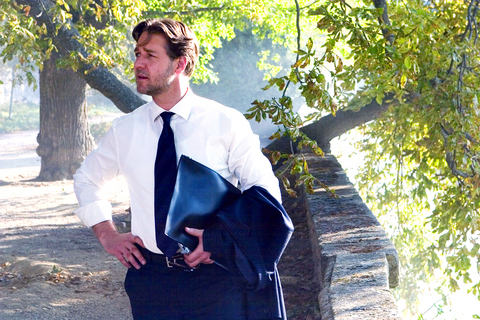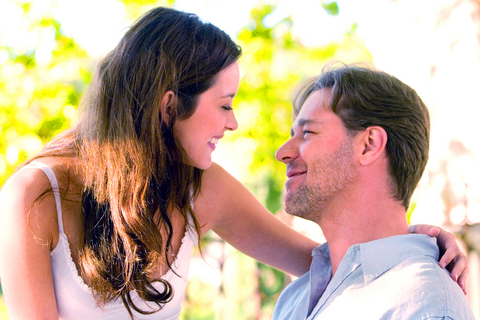Russell Crowe needed a vacation after reaching out and touching someone with a telephone got him arrested for assault. What better place to rehab your temper than the peaceful splendor of France's wine country?
Might as well make a film while you're there.
A Good Year is a lighter choice than usual for the rugged actor and for Ridley Scott, who directed Crowe to an Oscar in Gladiator. A change of scenery suits them well.

Yet they still bring a roguish flavor to the romantic comedy sentiments established by Peter Mayle's novel. This is a chick flick for dudes, too.
Crowe plays Max Skinner, a London stock trader who risks investigation for manipulating prices to earn a fortune. Max gloats, then returns home to news that his beloved uncle Henry (Albert Finney in flashbacks) has died.
Max was last happy as a child on a summer visit to Henry's vineyard and chateau. Scott begins A Good Year with an excellent sequence between Finney and Freddy Highmore (Finding Neverland) as young Max. We immediately learn the intimate appeal of winemaking and its parallels to human nature. We also get the lay of the gorgeous land and Henry's romantically decaying home.

PHOTOS COURTESY OF FOX
As Henry's only known survivor, Max inherits the place. He plans to sell it and his memories for a handsome sum.
That doesn't sit well with Francis Duflot (Didier Bourdon), the vineyard's longtime caretaker and practically Henry's son. Word of an impending deal quickly spreads to the village, where Henry was a local celebrity. Sultry bistro server Fanny Chenal (the ravishing Marion Cotillard) is the most irritated, but she still enchants Max.
Then it gets more complicated with the arrival of Christie Roberts (Abbie Cornish), an American who also intrigues Max until she informs him that Henry was her biological father. Henry's spirit and Fanny's spunk already had Max reconsidering the sale. Now he may not get the girl or the grapes.
Crowe easily handles Max's caustic moments with a smarmy jaunt. He has good reason to soften in France, where screenwriter Marc Klein gives Francis and Fanny withering lines of provincial wisdom to put Max in his place. Christie is almost one too many ingredients. The arrival of Max's lawyer (Rafe Spall) as another love interest certainly is.
A Good Year runs about a month too long, but it's tough to leave such a lovely place. Scott blends the don't-rush-past-love appeal of Jerry Maguire with the continental air of Under the Tuscan Sun for a robustly romantic diversion. And not once does Crowe stomp on the grapes.
For the premiere Crowe had taken a break from shooting American Gangster, a 1970s crime epic in which he stars as a detective turned prosecutor and Denzel Washington plays a Harlem heroin lord. Crowe appeared to bring that production's energy with him up to Canada, and he seemed eager to get back to the set.
What drew him to both American Gangster and A Good Year was the movies' maker, Ridley Scott, who directed him in 2000's Gladiator. They had tried to work together since that film, but their schedules never harmonized. "We ended up doing things with other people that we would have preferred to do together," Crowe said. But timing wasn't the only problem.
There was the nagging pressure of expectation. Crowe said he and Scott would visit studios to pitch a second film together, and the executives would get nervous about besting the success of Gladiator, which made piles of money and won four Oscars, including best picture and best actor for Crowe. But Crowe found the hemming and hawing ridiculous.
"All we wanted to do is make a movie," he said. "We were going to work together and have fun like we did before." The two sat down with a bunch of scripts and settled on the lightest of the lot, an adaptation of Peter Mayle's comic novel, which was set mostly in the vineyards of Provence. Crowe remembered telling Scott, forget "all the big things with the blood. Let's do this." To Crowe's mind, such a modest picture would "neutralize all those expectations and totally free us up."
And, indeed, the film is Scott's loosest and most buttery. It's as much a tickling hors d'oeuvre as Black Hawk Down was a harrowing war picture. The light shimmers like Chardonnay, and the character actors in both London and France are big and colorful. And at the center of the picture is Crowe, who has never seemed more at ease.
Crowe's mirth in the film is unusual. The movie is a break from the unhappiness, instability, and anger (both bottled and uncorked) he has tapped for Proof of Life, Gladiator, The Insider, A Beautiful Mind, and to a lesser extent, Cinderella Man. The explanation for his obvious comfort was his chemistry with Scott. Occupationally, what these two have is mutual admiration. By the fourth day of filming A Good Year, Crowe knew they hadn't missed a beat in their time away from each other.
"We're really heavily connected now," he said, "We have a connection in aesthetic. We have a connection in work ethic. We have a connection in our senses of humor. He knows the thing that no one gets in articles: I'm a great lieutenant. I work for the boss."
Scott is in complete agreement. "I love to work quickly, and he does as well. We keep it fresh," the director said, calling near the New York City set of American Gangster. Amiably, he echoed Crowe's sentiments about the importance of logic and truth, insisting that he and Crowe really are easy-breezy types. Scott also suggested that A Good Year appealed to Crowe for the simple reason that it's different from the sorts of roles Crowe typically chooses. "It's not as heavy."
Crowe said tales of his being a dominant personality during production are false. "On the set I don't require people to look away when I walk in or bring me grapes peeled on the end of a toothpick," he said, taking a moment to laugh at the idea. If Crowe becomes cross on a shoot it's because the director doesn't know what he wants. Or worse, he's changed his mind. If directors "start to go back into something which is just a standard movie or something that has no thought of what the humanity is in this moment or the logistics of that moment, then they're breaking that deal."
Unsurprisingly, Crowe said that his reputation as a brute is unearned. But in defending himself, he doesn't sound defensive.
"I couldn't do the types of roles that I've done without being a sensitive person," he said, which implies, of course, that he's also sensitive to his unflattering treatment in the media. He mentions trying to "put bad times in a box" — including his notorious relationship with Meg Ryan, that flap at the hotel with the phone, and the recent death of his friend Steve Irwin. Crowe is philosophical about the phone incident and the roasting he took. "It was my time to be on the dartboard."
If Crowe's performance in A Good Year seems effortless, making it was easy. "There was no striving," he said. "You have to feel everything that's around you, be light on your feet, trippingly off the tongue. That's how you do good work."
While Crowe, in an interview, seemed resistant to the idea that there's something enjoyably movie-starry about the banker he plays in A Good Year (few humble actors would cop to that, anyway), Scott said that is exactly what he wanted from Crowe — "something classic."

The canonical shot of an East Asian city is a night skyline studded with towering apartment and office buildings, bright with neon and plastic signage, a landscape of energy and modernity. Another classic image is the same city seen from above, in which identical apartment towers march across the city, spilling out over nearby geography, like stylized soldiers colonizing new territory in a board game. Densely populated dynamic conurbations of money, technological innovation and convenience, it is hard to see the cities of East Asia as what they truly are: necropolises. Why is this? The East Asian development model, with

June 16 to June 22 The following flyer appeared on the streets of Hsinchu on June 12, 1895: “Taipei has already fallen to the Japanese barbarians, who have brought great misery to our land and people. We heard that the Japanese occupiers will tax our gardens, our houses, our bodies, and even our chickens, dogs, cows and pigs. They wear their hair wild, carve their teeth, tattoo their foreheads, wear strange clothes and speak a strange language. How can we be ruled by such people?” Posted by civilian militia leader Wu Tang-hsing (吳湯興), it was a call to arms to retake

This is a deeply unsettling period in Taiwan. Uncertainties are everywhere while everyone waits for a small army of other shoes to drop on nearly every front. During challenging times, interesting political changes can happen, yet all three major political parties are beset with scandals, strife and self-inflicted wounds. As the ruling party, the Democratic Progressive Party (DPP) is held accountable for not only the challenges to the party, but also the nation. Taiwan is geopolitically and economically under threat. Domestically, the administration is under siege by the opposition-controlled legislature and growing discontent with what opponents characterize as arrogant, autocratic

When Lisa, 20, laces into her ultra-high heels for her shift at a strip club in Ukraine’s Kharkiv, she knows that aside from dancing, she will have to comfort traumatized soldiers. Since Russia’s 2022 invasion, exhausted troops are the main clientele of the Flash Dancers club in the center of the northeastern city, just 20 kilometers from Russian forces. For some customers, it provides an “escape” from the war, said Valerya Zavatska — a 25-year-old law graduate who runs the club with her mother, an ex-dancer. But many are not there just for the show. They “want to talk about what hurts,” she